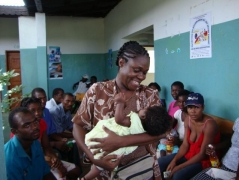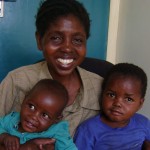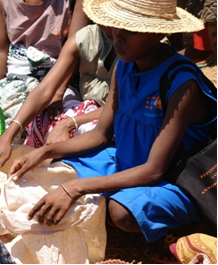New IYCN materials
New IYCN materials
Haiti: National norms for safe feeding of HIV-exposed infants and young children
Success story: Improving infant feeding to protect babies from HIV in Zambia
Handout: The Case for Preventing Malnutrition
Helpful links and publications
View hunger and food security resources
View a new USAID fact sheet on nutrition and food security
Learn about successful community-based nutrition approaches from our partners
News from our colleagues
PATH’s Ultra Rice named a 2009 Tech Award Laureate by The Tech Museum of Innovation
Welcome to the third issue of the IYCN Update, a newsletter from USAID’s Infant & Young Child Nutrition (IYCN) Project. Distributed four times per year, each issue offers updates on the latest research, new resources, and project news.
Research highlights
Promising new research on HAART during breastfeeding
New research on highly active anti-retroviral treatment (HAART) and breastfeeding shows great promise for the prevention of mother-to-child transmission of HIV. In July 2009, researchers announced findings from several highly anticipated studies at the International AIDS Society Conference (IAS) in Cape Town, South Africa. Researchers showed that giving HAART to women who do not qualify for treatment or infants during breastfeeding can significantly reduce transmission of HIV to infants during breastfeeding. Read more and view summaries of the studies.
New analysis of outcomes and costs for school feeding programs
In a study to be published in the Food and Nutrition Bulletin in October 2009, researchers conducted a systematic review of school feeding programs in four African countries and found that the average cost of school feeding programs was $40 per child—double the World Food Program’s most recent cost estimate of $20 per child. Read more.
The impact of Integrated Management of Childhood Illness in Bangladesh
In a cluster randomized trial published in The Lancet in August 2009, investigators evaluated the impact of the Integrated Management of Childhood Illness (IMCI) strategy on health workers’ skills and support, care-seeking practices, feeding practices, and health outcomes in children under five in rural Bangladesh. They found no differences in mortality between the IMCI intervention and non-intervention areas. However, children in IMCI areas were more likely to have been exclusively breastfed and less likely to be stunted. Read more.
Adding zinc to iron/folic supplementation for pregnant women improves growth
In a study published in the Journal of Clinical Nutrition in July 2009, investigators examined the growth outcomes of children six to eight years old in Nepal whose mothers had received one of five micronutrient combinations during pregnancy: folic acid, folic acid + iron, folic acid + iron + zinc, multiple micronutrients, or a control. The only micronutrient formulation to show a positive effect on growth was folic acid + iron + zinc. The authors suggest further exploration of the potential benefits of adding zinc to the standard iron/folic acid supplement. Read more.
Continued breastfeeding increases HIV-free survival
The Zambia Exclusive Breastfeeding Study randomized HIV-positive mothers to wean their infants after four months (intervention) or to continue breastfeeding for as long as they wished and found no HIV-free survival advantage for early weaning. A secondary analysis, published in PLOS One in June 2009, investigated whether maternal disease severity modified the relative risks of HIV infection and death associated with adherence to the intervention. Among infants whose mothers had higher CD4 counts or less advanced disease, breastfeeding continued to have a protective effect until the age of 15 months. Read more.
Point of view
Better nutrition is central to addressing hunger and food security
In a new commentary on the IYCN website, Denise Lionetti, IYCN project director, talks about the importance of prioritizing nutrition programs as part of a comprehensive strategy to alleviate global hunger and promote food security. She urges the nutrition community to engage now in dialogue on global food security policy.
Country spotlight: Madagascar
Helping partners address nutrition gaps
For Flora Bertizzolo, 30, a health and nutrition program officer at the United Nations World Food Program (WFP), getting food to children in need in Madagascar is her first priority. She and her colleagues at the WFP office in Madagascar run a program that provides food assistance to more than 65,000 mothers and children in the most food-insecure areas of the country during the lean season.
But she believes the families she serves need more than food to prevent malnutrition. That is why the WFP team—located in the capital city of Antananarivo and in sub-offices around the country—collaborates with other organizations to make sure that food is part of an integrated effort to prevent malnutrition and improve health.
“Food is not the only solution to nutritional problems. We need to work with a range of partners who offer behavior change interventions, health systems strengthening, and capacity building in order to effectively reduce malnutrition,” she said.
Project news
Celebrating World Breastfeeding Week
 IYCN joined partners around the globe during World Breastfeeding Week, August 1 to 7, 2009, to highlight the critical role of breastfeeding before and during emergencies. IYCN worked with partners in several countries to commemorate the campaign. Highlights included:
IYCN joined partners around the globe during World Breastfeeding Week, August 1 to 7, 2009, to highlight the critical role of breastfeeding before and during emergencies. IYCN worked with partners in several countries to commemorate the campaign. Highlights included:
Zambia introduced a new media campaign to promote exclusive breastfeeding. View a television spot from the campaign.
Kenya held a National Infant Feeding Stakeholders’ Meeting, sponsored by IYCN. Read a message from IYCN’s project director Denise Lionetti about her experience at the meeting.
Haiti and Lesotho held community and national events to promote good infant feeding practices. Read more.
New infant feeding guidance for health workers in Haiti
 In Haiti, a lack of infant feeding guidance for health workers resulted in the spread of potentially harmful messages for mothers—especially messages for counseling HIV-positive mothers on good feeding practices for their babies. To offer clear direction for health workers to effectively support mothers on infant feeding, IYCN worked with the Ministry of Health to introduce a new national guide, National Norms for Safe Feeding of HIV-exposed Infants and Young Children.
In Haiti, a lack of infant feeding guidance for health workers resulted in the spread of potentially harmful messages for mothers—especially messages for counseling HIV-positive mothers on good feeding practices for their babies. To offer clear direction for health workers to effectively support mothers on infant feeding, IYCN worked with the Ministry of Health to introduce a new national guide, National Norms for Safe Feeding of HIV-exposed Infants and Young Children.
To help create the guide and get support from key stakeholders, IYCN brought together more than 100 partner organizations to discuss conflicting messages about infant feeding for children affected by HIV. In August, the Ministry of Health started introducing the guide to health workers across the country.
View the national norms for safe feeding of HIV-exposed infants and young children (in French).
Conferences
Join us in Bangkok at the International Congress of Nutrition
Planning on going to this year’s International Congress on Nutrition (ICN) conference? Join IYCN and USAID on October 8, 2009, for a symposium: Communication and Partnership Building to Improve Child Nutrition. Panelists, including IYCN’s Tom Schaetzel, will share experiences of how communication and partnership building has been critical to the successful implementation of programs in diverse contexts. Dr. Schaetzel will also present An Evaluation of AIN-C Community-Based Growth Promotion in Honduras as part of another panel.
CAPGAN 2009: Making a case for prevention of severe acute malnutrition
IYCN presented a poster on the case for prevention of severe acute malnutrition (SAM) at the 10th Commonwealth Association of Paediatric Gastroenterology and Nutrition (CAPGAN) Congress on Diarrhoea & Malnutrition in Blantyre, Malawi, which took place from August 12 to 16, 2009. The poster outlines arguments for investing in prevention of SAM rather than in the universal introduction of SAM treatment.
Also at the conference, IYCN presented results from the first phase of a study which aims to understand infant feeding practices in Malawi. The project will publish results from the study later in the year after the second phase has been completed.
Learn more and download a handout of IYCN’s poster on the case for preventing malnutrition.
IAS 2009: IYCN assessment reveals lack of adequate infant feeding training in Kenya
IYCN presented observations of provider practices from an infant feeding assessment in Kenya at the 5th International AIDS Society (IAS) Conference on HIV Pathogenesis, Treatment and Prevention in Cape Town, South Africa, on July 19, 2009. Among the results, IYCN found that lack of training leads to inappropriate infant feeding information given to mothers. The presentation was part of a satellite session, Infant Feeding and HIV: Science and Practice, hosted by the Elizabeth Glaser Pediatric AIDS Foundation.
Learn more and view the presentation.
We welcome your feedback and suggestions for our next issue. Please contact: info@iycn.org.
Photos: Aurelio Ayala III, World Food Program, PATH/Evelyn Hockstein, Jennifer Latortue.
Date: Sep 6, 2009 | Category: Newsletters


